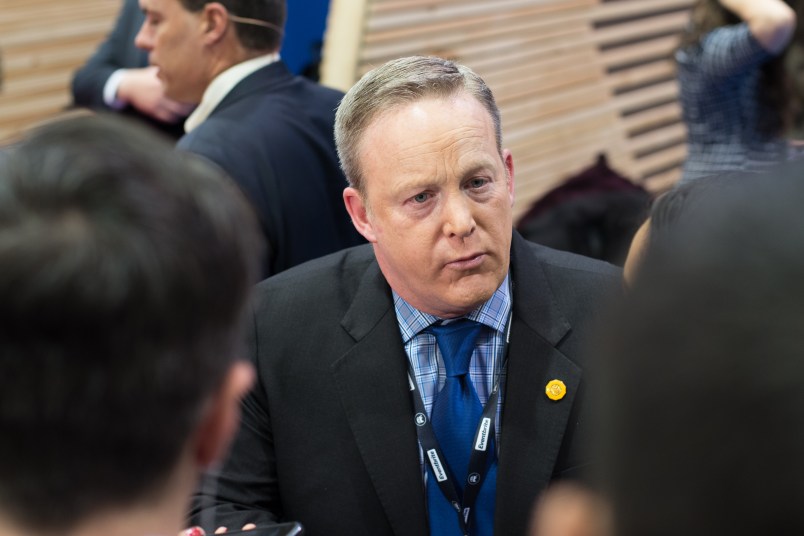Donald Trump’s latest line of attack against Hillary Clinton is putting Republicans in an awkward position, with even the GOPers out stumping for his campaign squirming when pressed whether they agree with his claim that Clinton is a “bigot.”
As Clinton this week ramped up her attacks on Trump’s connections to the alt-right movement, the GOP nominee countered by explicitly labeling her a “bigot,” first in a speech slamming her “bigotry” earlier this month and then during an interview with Anderson Cooper Thursday evening where he said, “She is a bigot.”
The other officials in his party and even in his own campaign, so far, are a little less eager to use the term.
Republican National Committee spokesman Sean Spicer, when asked Friday if he agreed, demurred that he stayed away from such language.
“No, I think some of the policies that she’s supported have not helped African-Americans, but I think anybody who knows me, I just don’t tend to use certain words,” he told MSNBC. He argued, however, that Clinton’s policies “have kept people trapped in poverty” and “let education standards fall by the wayside.”
Ben Carson — a former GOP primary rival and now a Trump surrogate — suggested to the Daily Beast that he’d prefer Trump not throw around the label.
“I don’t generally get into the name-calling thing,” Carson said. “I kind of left that behind in the third grade. I certainly don’t encourage it because the issues that we’re facing are incredibly important—for us and for the future generations.”
He argued that Democrats policies have failed African Americans, but when it comes to name calling by both sides, he said, “That’s what people do who don’t have anything to talk about.”
Rep. Steve King (R-IA), no stranger to controversy over racially charged remarks, refused to engage in the attack.
“I don’t use names like that and I wish we didn’t use those names in politics. But it simply cheapens it all whenever it comes out, whatever side it’s on,” King said on MSNBC. He went to blame Democrats for using “dog whistle language” while defending Trump of any accusations that he is a racist.
“I don’t know real racists in this world and I don’t know real bigots in this world. But I sure know a lot of people that have had that label attached to them without justification,” King said.
Sean Jackson, the chairman of Florida’s Black Republican Caucus, said that he wouldn’t “use the precise word ‘bigotry.’”
Asked why Trump would use the term, he said on MSNBC, “The fact of the matter is I can’t speak for as to why Mr. Trump would use specific words and terms.”
“However, what I can say is that the actions that Secretary Clinton has performed over the course of her 27 years and politics has in fact portrayed that of bigotry,” he added. “I wouldn’t use the word myself, per se, however her actions do line up with that of bigotry.”
New Jersey Gov. Chris Christie (R), a Trump advisor, simply ignored the question.
“Next question,” Christie says after a reporter asks whether he thinks Clinton is a bigot.
— Matt Arco (@MatthewArco) August 26, 2016
Former Rep. Jack Kingston (R-GA), after expressing a desire to get “ beyond the name-calling,“ was reminded by MSNBC’s Craig’s Melvin that it was his party’s nominee who was the one who had called Clinton a bigot. Kingston attempted to turn it around by accusing Democrats of being name-callers themselves.
“The Democrat national convention, which, by the way, I attended, you can hardly watch that on prime time TV with children in the room. There was so much name-calling,” Kingston said. “It was so disappointing. … We should get away from name-calling, I am with you on that.”







Well, it’s about time the media began to do its job . . . If they continue, there will be quite a bit of sweating by GOPers.
The Party of NO just doesn’t get it…
GOP plots early wake-up call for Clinton
Looking past Election Day, Republicans sketch plan to stymie a President Hillary Clinton agenda.
And You thought you tuned into the Presidential Race —
So Carson agrees Trump is acting like a third grader?
Interesting.
The media and voters need to make these GOP porkers squeal like a piggy.
The media and voters also have to look no further than the distribution of Capitol Hill interns, as to why the GOP might just be bigot central